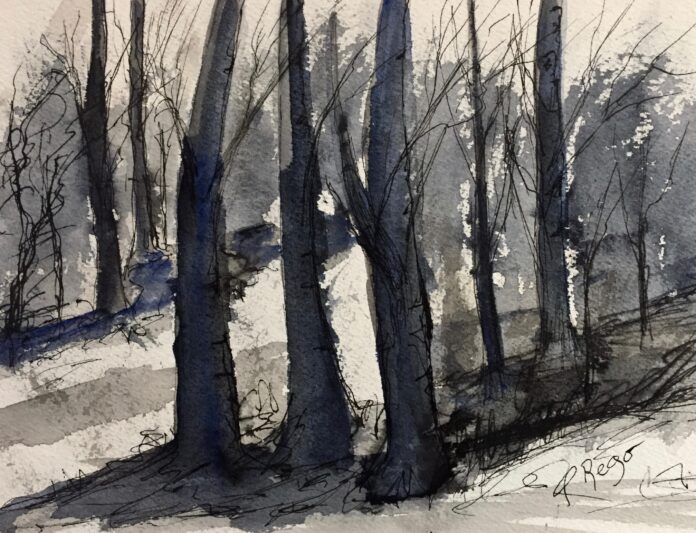BY LESLIE REGO

On Monday, Dec. 17,1804, William Clark wrote in his journal, “about 8 oClock P M. the thermmeter [sic] fell to 75 degrees below freesing [sic] pointe.”
For days, Clark had described the extremely cold weather and also the abundance of falling snow. After reading these words, I thought to myself, “even in a couple of weeks, I have a hard time believing it will be that cold or we will have that much snow.”
As I write, I can see a very scrappy 1 inch of snow covering some of the land surrounding me. There remain large sections of exposed ground. The uncovered leaves and twigs generate a rough and tumble look. On the mountain, the snow is even more irregular, with scraped surfaces interrupted with prostrate dead trees, old branches and piles of leaves. Stones peek out everywhere. Nature is certainly showing its straggly side.
As I write, I see a meticulously constructed spider’s web glinting in the light. That recalls the image of a bird’s nest, built layer by layer.
There is order in the first uncurling of leaves to the last leaf left on the tree at the end of the season. But looking outside right now, all I see is disorder, as if the world is waiting for the first snow to fall to smooth out the landscape and even out all of the rough edges.
I begin to dwell on Clark’s description, “75 degrees below freesing pointe.” I think that at those temperatures, winter is making a real statement. Don’t get me wrong. I don’t want it to be 75 degrees below zero here in the Wood River Valley, but Clark’s winter was definitely not in limbo. His winter was not undecided about whether to show itself.
We live in an indecisive time, vacillating between a traditional definition of winter and a new interpretation. For now, I must find the beauty in the bare branches and the bare hills that surround me.
Leslie Rego is an Idaho Press Club award-winning columnist, artist and Blaine County resident. To view more of Rego’s art, visit leslierego.com.



